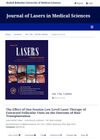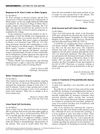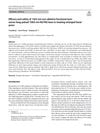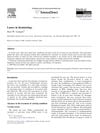 9 citations,
May 2005 in “Facial plastic surgery”
9 citations,
May 2005 in “Facial plastic surgery” Laser hair removal can be safe and effective for dark-skinned individuals with the right laser settings.
 9 citations,
March 2005 in “Aesthetic surgery journal”
9 citations,
March 2005 in “Aesthetic surgery journal” The long-pulse alexandrite laser effectively removes hair permanently.
 8 citations,
September 2021 in “Facial plastic surgery & aesthetic medicine”
8 citations,
September 2021 in “Facial plastic surgery & aesthetic medicine” Low-level light/laser therapy is effective in treating male and female pattern hair loss without side effects.
Laser diode light boosts hair follicle cell growth and certain gene expressions.
8 citations,
May 2004 in “Facial plastic surgery clinics of North America” Laser hair removal is now more effective, but the best treatment schedule is still uncertain.
 7 citations,
March 2020 in “Lasers in Medical Science”
7 citations,
March 2020 in “Lasers in Medical Science” LLLT is a safe, promising hair loss treatment, but more research needed.
7 citations,
April 2016 in “PubMed” Laser Doppler imaging can predict how well minoxidil will work for female hair loss.
 7 citations,
March 2016 in “Journal of Cosmetic and Laser Therapy”
7 citations,
March 2016 in “Journal of Cosmetic and Laser Therapy” Home-use lasers and IPL devices are unlikely to directly cause paradoxical hair growth; it may be linked to inflammation or hormonal issues.
7 citations,
May 2014 in “Iranian Red Crescent medical journal” Laser hair removal is effective for hirsutism when combined with treatment for the underlying causes.
7 citations,
April 2006 in “Lasers in medical science” Acneform reactions after laser hair removal occur in 6% of cases, mostly mild and short-lived, with higher risk in younger patients, those treated with Nd:YAG laser, and individuals with darker skin.
 6 citations,
September 2019 in “Journal of Cosmetic Dermatology”
6 citations,
September 2019 in “Journal of Cosmetic Dermatology” Laser treatment effectively increases hair density and thickness in androgenic alopecia.
 6 citations,
September 2018 in “Journal of Dermatological Treatment”
6 citations,
September 2018 in “Journal of Dermatological Treatment” LLLT devices for hair loss need more research to define proper guidelines.
 6 citations,
January 2016 in “Journal of lasers in medical sciences”
6 citations,
January 2016 in “Journal of lasers in medical sciences” One session of Low Level Laser Therapy before hair transplantation doesn't significantly improve hair growth.
 6 citations,
April 2012 in “Lasers in surgery and medicine”
6 citations,
April 2012 in “Lasers in surgery and medicine” Laser hair removal can cause a severe itchy rash in some allergic individuals, treatable with steroids.
6 citations,
March 2010 in “Journal of plastic, reconstructive & aesthetic surgery” Laser treatment can fix skin color issues after syndactyly surgery.
 5 citations,
January 2021 in “Veterinary dermatology”
5 citations,
January 2021 in “Veterinary dermatology” Low-level laser therapy did not reduce licking or improve lesions in dogs with ALD but did increase hair growth.
5 citations,
December 2020 in “Bioengineering & translational medicine” Researchers used a laser to create advanced skin models with hair-like structures.
 5 citations,
April 2019 in “Plastic and reconstructive surgery. Global open”
5 citations,
April 2019 in “Plastic and reconstructive surgery. Global open” Fractional lasers could help hair regrowth in androgenic alopecia, but more research is needed to confirm their effectiveness and safety.
 5 citations,
November 2014 in “Hair transplant forum international”
5 citations,
November 2014 in “Hair transplant forum international” Low Level Laser Therapy can promote hair growth.
5 citations,
March 2013 in “Journal of cosmetic and laser therapy” Laser treatment successfully removed unwanted facial hair caused by minoxidil.
 5 citations,
May 1999 in “Dermatologic Surgery”
5 citations,
May 1999 in “Dermatologic Surgery” Lasers can effectively treat pseudofolliculitis barbae, but insurance often doesn't cover it, possibly due to racial bias.
 4 citations,
January 2011 in “Current problems in dermatology”
4 citations,
January 2011 in “Current problems in dermatology” At-home laser and light devices can safely reduce acne and hair growth when used correctly but are less effective than professional treatments.
4 citations,
August 2015 in “JEADV. Journal of the European Academy of Dermatology and Venereology/Journal of the European Academy of Dermatology and Venereology” Both fixed and incremental laser treatments effectively reduced underarm hair, but the fixed method was less painful.
 4 citations,
March 2007 in “Hair transplant forum international”
4 citations,
March 2007 in “Hair transplant forum international” The document's conclusion cannot be provided as the content is not available.
4 citations,
November 2000 in “Dermatologic surgery” The cooling gel reduces pain during laser hair removal.
 4 citations,
August 2022 in “Lasers in medical science”
4 citations,
August 2022 in “Lasers in medical science” Both 1565-nm laser and 1064-nm laser safely and effectively reduce enlarged facial pores, with the 1064-nm laser causing fewer side effects.
 4 citations,
December 2016 in “Medical lasers”
4 citations,
December 2016 in “Medical lasers” Lasers can be effective for treating hair loss from alopecia areata.
 3 citations,
April 2017 in “Dermatologic Surgery”
3 citations,
April 2017 in “Dermatologic Surgery” Laser hair removal can be an effective last-resort treatment for men with stubborn Alopecia Areata who want to be uniformly bald.
3 citations,
May 2011 in “Facial plastic surgery clinics of North America” Laser treatments can effectively reduce fine wrinkles and improve skin texture.
 3 citations,
March 2008 in “Medical laser application”
3 citations,
March 2008 in “Medical laser application” Lasers have become safer and more effective for treating skin problems and hair removal.



















